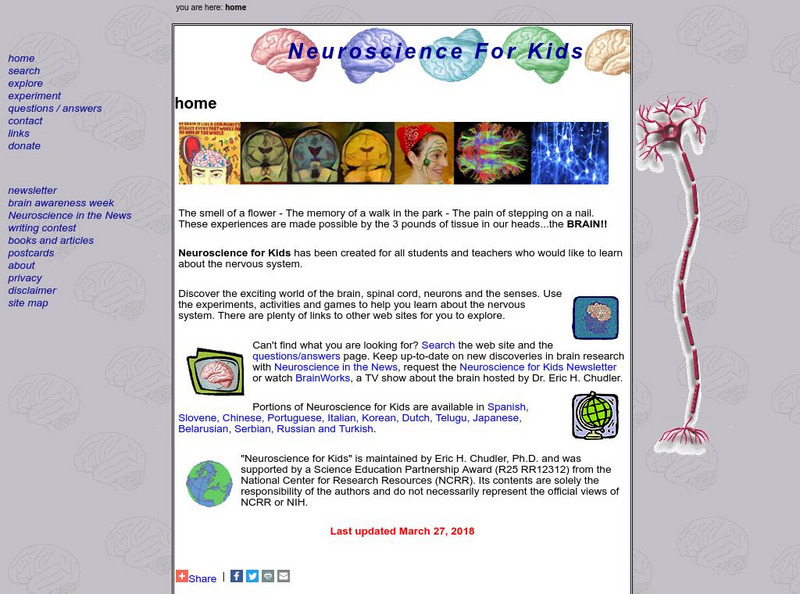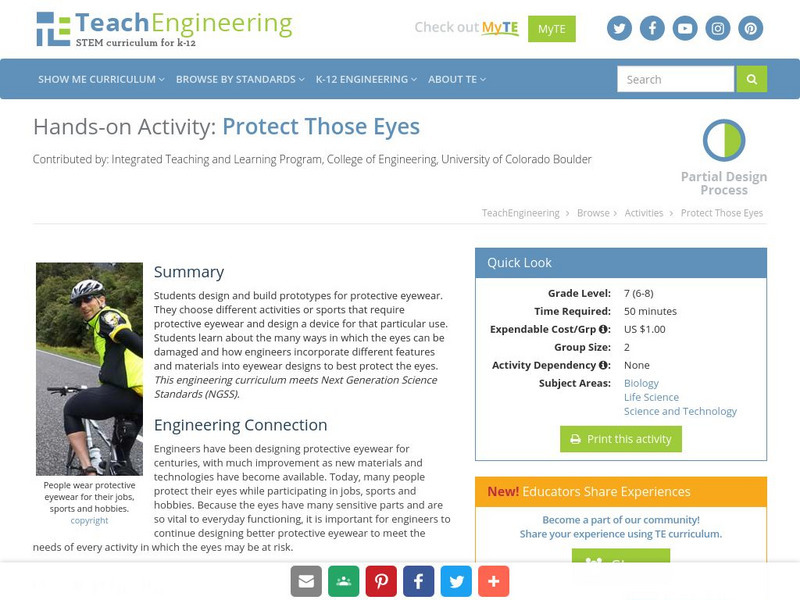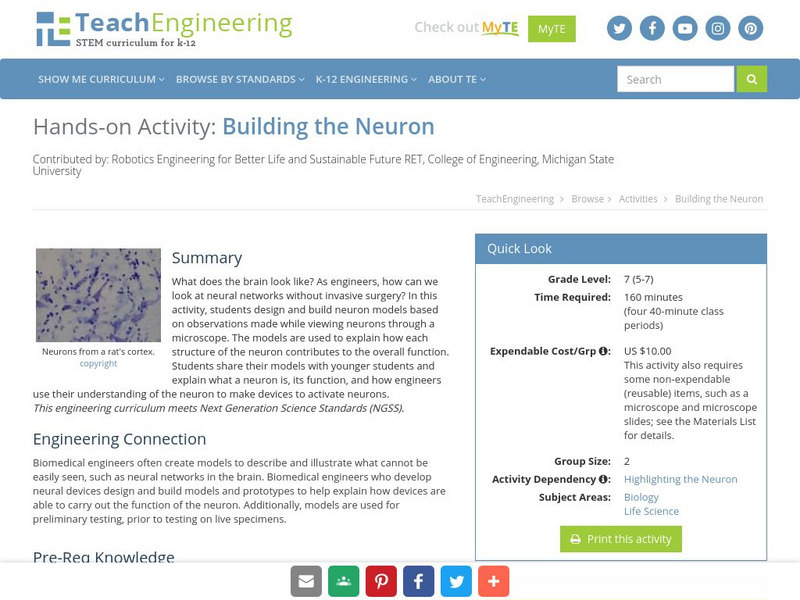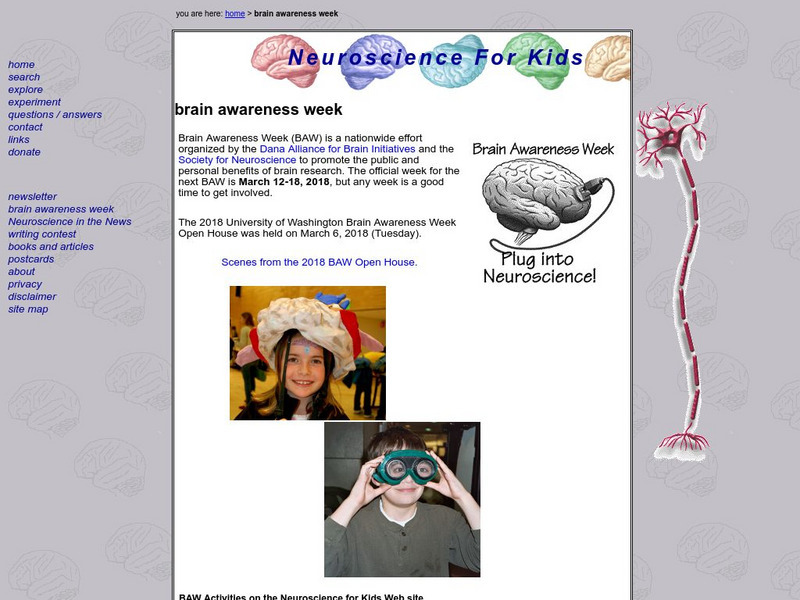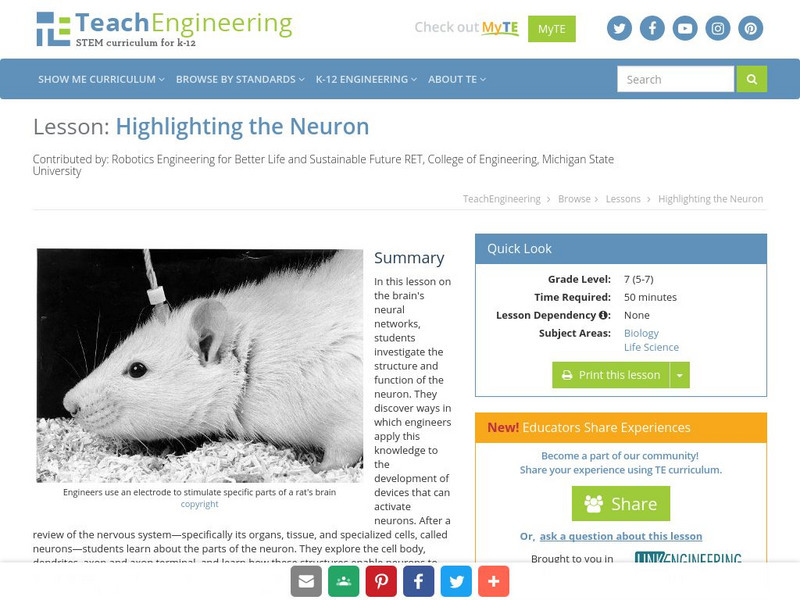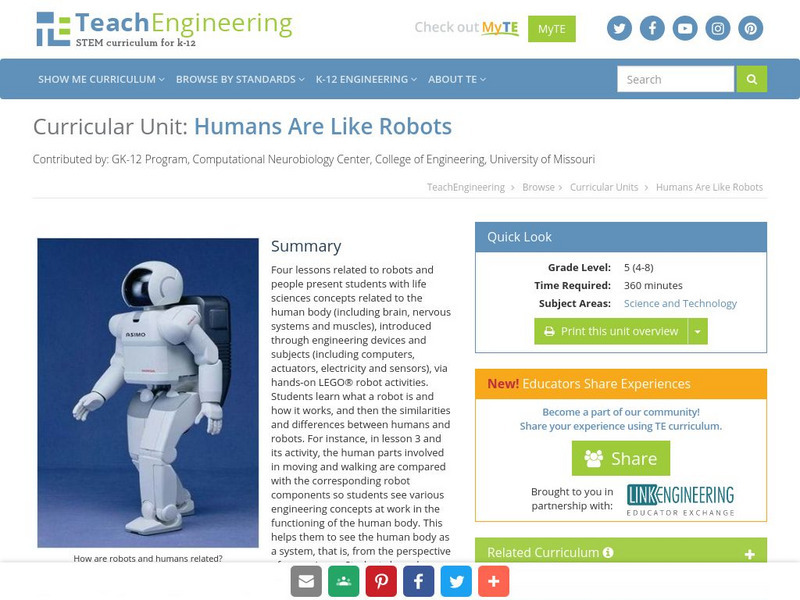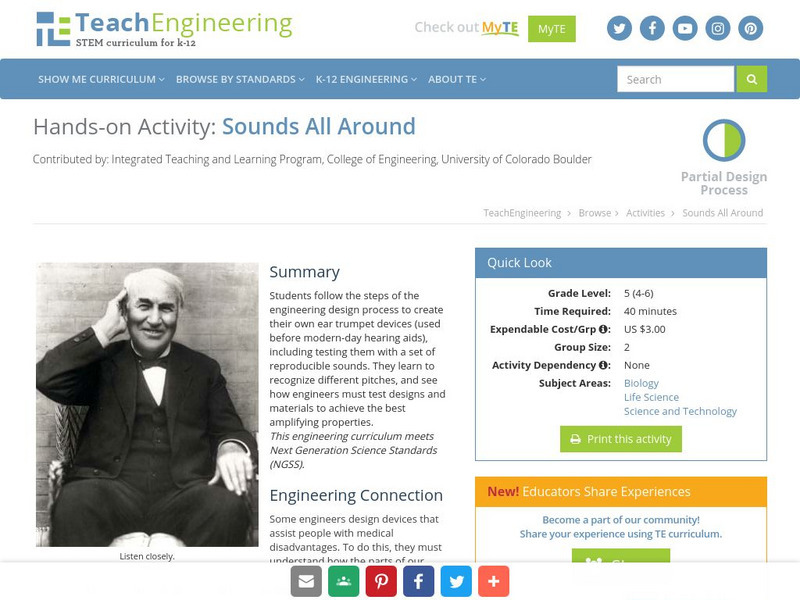Hi, what do you want to do?
CK-12 Foundation
Ck 12: Life Science: Keeping the Nervous System Healthy
[Free Registration/Login may be required to access all resource tools.] Activities that challenge your brain, such as working on a Sudoku puzzle, are good for the health of your nervous system. Just like you need to work out your body to...
Curated OER
Kids Health: How the Body Works Movies and Activities
Short, colorful movies explain each of the body's systems: skeletal, cardiovascular, digestive, urinary, respiratory, endocrine, skin, immune, muscular, and nervous. Once you've seen the movie, click on the Activity Page link for...
Howard Hughes Medical Institute
Hhmi: Biointeractive: The Virtual Neurophysiology Lab
Investigate the nervous system by looking at nerve cells in this virtual lab. This lab exercise allows students to experience a virtual dissection of a leech to use electronic equipment to explore the electrical activity of nerve cells....
University of Washington
University of Washington: Neuroscience for Kids
Created for all students and teachers who would like to learn more about the nervous system, this extensive University of Washington site offers information, resources, games, and activities galore. Offers dozens of links to related sites.
Indiana University
Indiana University: Sensory Integration: Tips to Consider
This article gives examples of how it looks when a child is experiencing sensory processing issues and gives tips on how to provide a sensory diet to "nourish" a child's nervous system. The examples and tips are categorized into groups...
National Institute of Educational Technologies and Teacher Training (Spain)
Ministerio De Educacion: Relacion Y Coordinacion
This unit will explore the nervous system which gives us the ability to reason, learn, communicate and develop our intelligence. It contains 27 interactive activities.
TeachEngineering
Teach Engineering: Protect Those Eyes
Students design and build prototypes for protective eyewear. They choose different activities or sports that require protective eyewear and design a device for that particular use. Students learn about the many ways in which the eyes can...
TeachEngineering
Teach Engineering: Building the Neuron
In this activity, students design and build neuron models based on observations made while viewing neurons through a microscope.
University of Washington
The Senses
This site has a collection of learning activities, games, experiments, and lesson plans on the five senses. Organized by grade level and topic, this site is packed with an assortment of interactive and engaging activities, that would...
University of Washington
Neuroscience for Kids: Brain Awareness Week
Although this site is for Brain Awareness Week, the many hyperlinks on the site are very worthwhile in the study of neuroscience. Be sure to check out the many activities on the experiments and activities page.
TED Talks
Ted: Ted Ed: How Stress Affects Your Body
Our hard-wired stress response is designed to give us the quick burst of heightened alertness and energy needed to perform our best. But stress isn't all good. When activated too long or too often, stress can damage virtually every part...
TeachEngineering
Teach Engineering: Highlighting the Neuron
In this lesson on the brain's neural networks, young scholars investigate the structure and function of the neuron. They discover ways in which engineers apply this knowledge to the development of devices that can activate neurons....
TeachEngineering
Teach Engineering: How Do Sensors Work?
Through six lesson/activity sets, students learn about the functioning of sensors, both human and robotic
NASA
Nasa: The Brain in Space
This educators guide shows students how the body's brain, spinal cord and network of nerves control the activities of animals and humans.
PBS
Newton's Apple: Reflexes
Newton's Apple informational site on reflexes. Includes vocabulary, resources, and several hands-on activities.
Exploratorium
Exploratorium: Science of Baseball: Biological Baseball
Younger students learn that hitting a baseball requires the use of various brain to body reaction activities and how those compare to the instincts and actions of animals.
National Institutes of Health
Nih Curriculum Supplement for Middle School: The Brain: Our Sense of Self
Through scientific inquiry this module introduces many concepts about the brain, its functions, and its importance in the sense of self. Included are a teacher's guide, interactive student web activities, and resources.
TeachEngineering
Teach Engineering: Our Bodies Have Computers and Sensors
Students learn about the human body's system components, specifically its sensory systems, nervous system and brain, while comparing them to robot system components, such as sensors and computers. The unit's life sciences-to-engineering...
TeachEngineering
Teach Engineering: Humans Are Like Robots
Four lessons related to robots and people present students with life sciences concepts related to the human body (including brain, nervous systems and muscles), introduced through engineering devices and subjects (including computers,...
TeachEngineering
Teach Engineering: Sounds All Around
Students follow the steps of the engineering design process to create their own ear trumpet devices (used before modern-day hearing aids), including testing them with a set of reproducible sounds. They learn to recognize different...
TeachEngineering
Teach Engineering: A Tasty Experiment
Students conduct an experiment to determine whether or not the sense of smell is important to being able to recognize foods by taste. They do this by attempting to identify several different foods that have similar textures. For some of...
TeachEngineering
Teach Engineering: Human and Robot Sensors
Students are provided with a rigorous background in human "sensors" (including information on the main five senses, sensor anatomies, and nervous system process) and their engineering equivalents, setting the stage for three associated...
Middle School Science
Lesson Plan: Earthworm Dissection
In this lesson plan site, you will "Learn the external and internal anatomy of the earthworm, understand the structure and function of external and internal organs, know the digestive, circulatory, reproductive, and nervous system, and...
Curated OER
Univ. Of Washington: Neuroscience for Kids
"Created for all students and teachers who would like to learn more about the nervous system," this extensive University of Washington site offers information, resources, games, and activities galore. Offers dozens of links to related...








